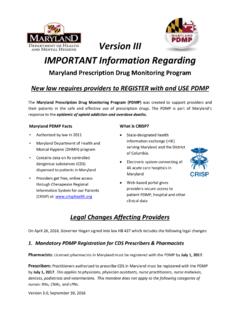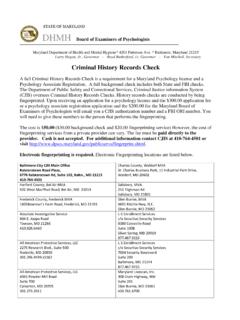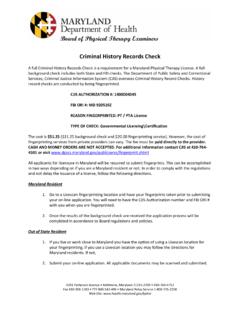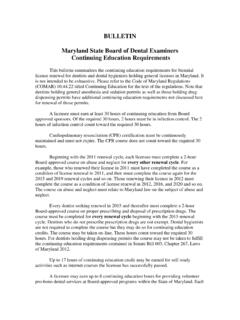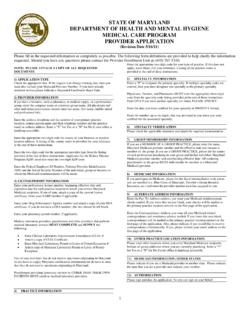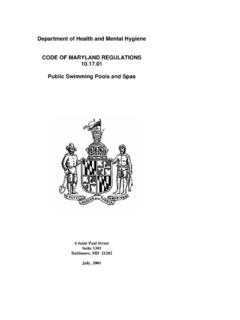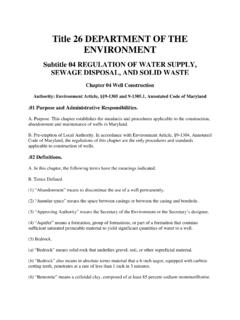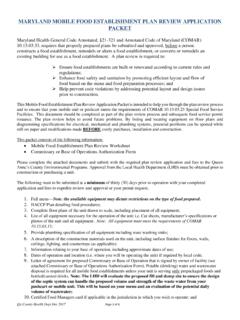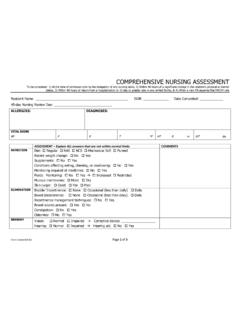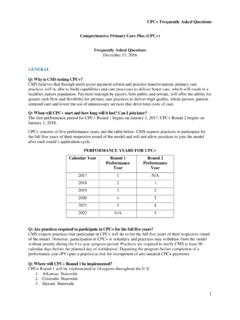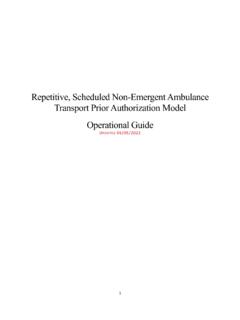Transcription of Health Care Practitioner Physical Assessment Form
1 Form 4506 Revised 9-15-09 1 Resident Name _____ Date Completed _____ Date of Birth _____ Health Care Practitioner Physical Assessment Form This form is to be completed by a primary physician, certified nurse Practitioner , registered nurse, certified nurse-midwife or physician assistant. Questions noted with an asterisk are triggers for awake overnight staff. Please note the following before filling out this form: Under maryland regulations an assisted living program may not provide services to a resident who, at the time of initial admission, as established by the initial Assessment , requires: (1) More than intermittent nursing care; (2) Treatment of stage three or stage four skin ulcers; (3) Ventilator services; (4) Skilled monitoring, testing, and aggressive adjustment of medications and treatments where there is the presence of, or risk for, a fluctuating acute condition; (5) Monitoring of a chronic medical condition that is not controllable through readily available medications and treatments; or (6) Treatment for a disease or condition that requires more than contact isolation.
2 An exception to the conditions listed above is provided for residents who are under the care of a licensed general hospice program. 1.* Current Medical and Psychiatric History. Briefly describe recent changes in Health or behavioral status, suicide attempts, hospitalizations, falls, etc., within the past 6 months. 2.* Briefly describe any past illnesses or chronic conditions (including hospitalizations), past suicide attempts, Physical , functional, and psychological condition changes over the years. 3. Allergies. List any allergies or sensitivities to food, medications, or environmental factors, and if known, the nature of the problem ( , rash, anaphylactic reaction, GI symptom, etc.). Please enter medication allergies here and also in Item 12 for medication allergies. 4.
3 Communicable Diseases. Is the resident free from communicable TB and any other active reportable airborne communicable disease(s)? (Check one) Yes No If No, then indicate the communicable disease: _____ Which tests were done to verify the resident is free from active TB? PPD Date: _____ Result:_____mm Chest X-Ray (if PPD positive or unable to administer a PPD) Date: _____ Result_____ Form 4506 Revised 9-15-09 2 Resident Name _____ Date Completed _____ Date of Birth _____ 5. History. Does the resident have a history or current problem related to abuse of prescription, non-prescription, over-the-counter (OTC), illegal drugs, alcohol, inhalants, (a) Substance: OTC, non-prescription medication abuse or misuse 1. Recent (within the last 6 months) Yes No 2.
4 History Yes No (b) Abuse or misuse of prescription medication or herbal supplements 1. Currently Yes No 2. Recent (within the last 6 months) Yes No (c) History of non-compliance with prescribed medication 1. Currently Yes No 2. Recent (within the last 6 months) Yes No (d) Describe misuse or abuse: _____ _____ 6.* Risk factors for falls and injury. Identify any conditions about this resident that increase his/her risk of falling or injury (check all that apply): orthostatic hypotension osteoporosis gait problem impaired balance confusion Parkinsonism foot deformity pain assistive devices other (explain) _____ 7.
5 * Skin condition(s). Identify any history of or current ulcers, rashes, or skin tears with any standing treatment orders. _____ _____ 8.* Sensory impairments affecting functioning. (Check all that apply.) (a) Hearing: Left ear: Adequate Poor Deaf Uses corrective aid Right ear: Adequate Poor Deaf Uses corrective aid (b) Vision: Adequate Poor Uses corrective lenses Blind (check all that apply) - R L (c) Temperature Sensitivity: Normal Decreased sensation to: Heat Cold 9. Current Nutritional Status. Height inches Weight lbs. (a) Any weight change (gain or loss) in the past 6 months? Yes No (b) How much weight change? lbs.
6 In the past months (check one) Gain Loss (c) Monitoring necessary? (Check one.) Yes No If items (a), (b), or (c) are checked, explain how and at what frequency monitoring is to occur: _____ _____ (d) Is there evidence of malnutrition or risk for undernutrition? Yes No (e)* Is there evidence of dehydration or a risk for dehydration? Yes No (f) Monitoring of nutrition or hydration status necessary? Yes No If items (d) or (e) are checked, explain how and at what frequency monitoring is to occur: _____ _____ (g) Does the resident have medical or dental conditions affecting: (Check all that apply) Chewing Swallowing Eating Pocketing food Tube feeding (h) Note any special therapeutic diet ( , sodium restricted, renal, calorie, or no concentrated sweets restricted): _____ _____ (i) Modified consistency ( , pureed, mechanical soft, or thickened liquids): _____ _____ (j) Is there a need for assistive devices with eating (If yes, check all that apply): Yes No Weighted spoon or built up fork Plate guard Special cup/glass (k) Monitoring necessary?
7 (Check one.) Yes No If items (g), (h), or (i) are checked, please explain how and at what frequency monitoring is to occur: _____ Form 4506 Revised 9-15-09 3 Resident Name _____ Date Completed _____ Date of Birth _____ 10.* Cognitive/Behavioral Status. (a)* Is there evidence of dementia? (Check one.) Yes No (b) Has the resident undergone an evaluation for dementia? Yes No (c)* Diagnosis (cause(s) of dementia): Alzheimer s Disease Multi-infarct/Vascular Parkinson s Disease Other (d) Mini-Mental Status Exam (if tested) Date _____ Score _____ 10(e)* Instructions for the following items: For each item, circle the appropriate level of frequency or intensity, depending on the item.
8 Use the Comments column to provide any relevant details. Item 10(e) A B* C* D* Comments Cognition I. Disorientation Never Occasional Regular Continuous II. Impaired recall (recent/distant events) Never Occasional Regular Continuous III. Impaired judgment Never Occasional Regular Continuous IV. Hallucinations Never Occasional Regular Continuous V. Delusions Never Occasional Regular Continuous Communication VI. Receptive/expressive aphasia Never Occasional Regular Continuous Mood and Emotions VII. Anxiety Never Occasional Regular Continuous VIII. Depression Never Occasional Regular Continuous Behaviors IX.
9 Unsafe behaviors Never Occasional Regular Continuous X. Dangerous to self or others Never Occasional Regular Continuous XI. Agitation (Describe behaviors in comments section) Never Occasional Regular Continuous 10(f) Health care decision-making capacity. Based on the preceding review of functional capabilities, Physical and cognitive status, and limitations, indicate this resident s highest level of ability to make Health care decisions. (a) Probably can make higher level decisions (such as whether to undergo or withdraw life-sustaining treatments that require understanding the nature, probable consequences, burdens, and risks of proposed treatment). (b) Probably can make limited decisions that require simple understanding.
10 (c) Probably can express agreement with decisions proposed by someone else. (d) Cannot effectively participate in any kind of Health care decision-making. 11.* Ability to self-administer medications. Based on the preceding review of functional capabilities, Physical and cognitive status, and limitations, rate this resident s ability to take his/her own medications safely and appropriately. (a) Independently without assistance (b) Can do so with Physical assistance, reminders, or supervision only (c) Need to have medications administered by someone else _____ _____ Print Name Date _____ Signature of Health Care Practitioner Form 4506 Revised 9-15-09 4 Resident Name _____ Date Completed _____ Date of Birth _____ PRESCRIBER S MEDICATION AND TREATMENT ORDERS AND OTHER INFORMATION Allergies (list all): _____ Note: Does resident require medications crushed or in liquid form?
